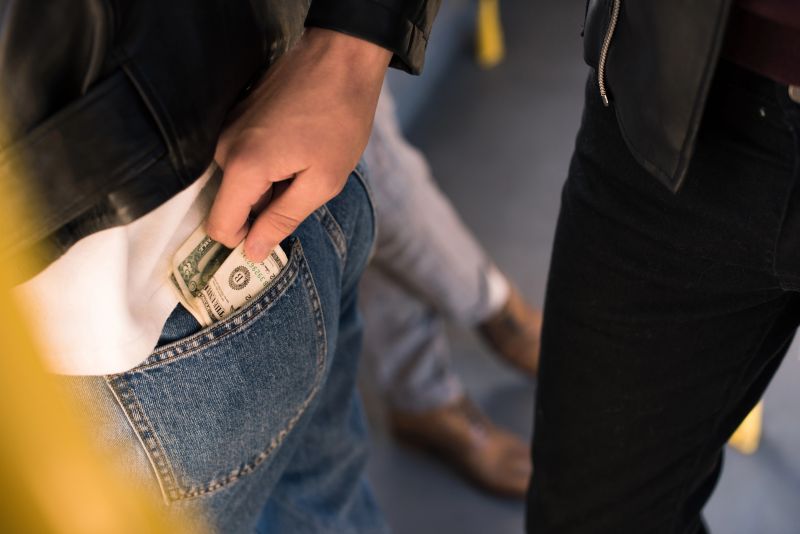Theft charges can turn your life upside down, bringing the risk of jail time, hefty fines, and a criminal record that will follow you for years. In Virginia, stealing property can lead to serious legal trouble, with consequences that vary depending on the severity of the offense. Understanding these penalties is the first step in protecting your rights.
A conviction for stealing can impact your freedom, finances, and future opportunities. This article guides you through larceny laws, the potential punishments, and the long-term effects of a conviction. See how a Fairfax County defense attorney can help reduce charges, minimize penalties, or even get your case dismissed.
What Counts As Theft Under Virginia Law?
Virginia law defines larceny as the unlawful taking of someone else’s property with the intent to deprive them of it permanently. Theft crimes fall under two main categories: petit and grand. The charge you face depends on the value of the stolen property and the circumstances of the offense.
Petit Larceny
Petit larceny involves stealing property worth less than $1,000. If someone takes an item directly from another person, such as picking a pocket, the threshold drops to less than $5. Even though the law classifies it as a misdemeanor, the consequences can be severe and long-lasting.
Petit larceny is a Class 1 misdemeanor that carries penalties, including up to 12 months in jail, fines up to $2,500, and possible probation or community service. Judges may also require offenders to repay victims for the value of stolen property.
A petit larceny conviction never disappears unless a court grants expungement. Employers and landlords often run background checks, and a theft charge can make them hesitant to approve applications. Courts also impose harsher penalties on repeat offenders, and prosecutors frequently push for steeper sentences when someone has prior convictions.
Even a first-time petit larceny charge can create long-term problems. Building a strong defense can help reduce or dismiss charges. Taking early legal action can prevent a mistake from limiting future opportunities.
Grand Larceny
Grand larceny applies when the stolen property is worth $1,000 or more or when theft from a person exceeds $5. Virginia also classifies auto theft and certain firearm-related thefts as grand larceny, regardless of the item’s value. This is a felony in Virginia, carrying much harsher consequences than a petit charge.
A conviction can result in up to 20 years in prison, though judges sometimes impose shorter sentences based on the case details. Courts also determine fines on a case-by-case basis, and offenders often must pay restitution to victims to cover stolen property losses.
A felony conviction affects nearly every part of life. Finding employment, securing housing, and qualifying for loans become more complicated with a felony record. Many companies refuse to hire applicants with theft-related felonies, and landlords often reject rental applications from those with a criminal background.
Additionally, convicted felons lose certain rights. Virginia law strips them of the right to vote, though they may petition for restoration later. They also lose the right to own or possess firearms. These restrictions make it even more challenging to move forward after a conviction, which is why a strong legal defense is critical.
Larceny charges have serious legal consequences, but the impact doesn’t stop there. Beyond jail time and fines, a conviction can result in additional penalties that affect everyday life. Understanding these consequences is as vital as knowing the legal punishments, as they can create lasting challenges.
Are There Penalties Beyond Jail And Fines?
Larceny convictions result in more than jail time or fines they create lasting hardships that affect finances, driving privileges, and even immigration status. These additional penalties make taking theft charges seriously and building a strong defense even more vital.
Restitution To Victims
Courts require those convicted of theft to repay victims for the value of stolen property, a financial obligation known as restitution. This payment is in addition to court fines and legal fees, making the economic impact even more significant. Even when authorities recover stolen items, judges may still order restitution to cover damages or losses related to the crime.
Civil Penalties For Shoplifting
Retailers in Virginia can sue shoplifters, even when criminal charges don’t lead to a conviction. State law allows businesses to demand up to twice the stolen item’s value, with penalties ranging from $50 to $350. Even small thefts can bring steep financial consequences, adding more stress to a difficult situation.
License Suspension For Certain Thefts
Some theft charges, especially those involving motor vehicles or specific auto parts, result in a driver’s license suspension. Losing the ability to drive makes it harder to get to work, attend school, or handle daily responsibilities. This penalty can be just as damaging as jail time or fines for those who rely on driving.
Impact On Immigration Status
Non-citizens with theft convictions risk severe immigration consequences, including visa revocation, denial of citizenship, or deportation. The law classifies theft as a crime of moral turpitude, creating severe obstacles for those seeking legal residency. Even a misdemeanor larceny conviction can disrupt immigration status and limit opportunities.
A conviction affects far more than just a criminal record it impacts finances, mobility, and immigration status. These added penalties make theft charges even more serious, showing why fighting for a favorable outcome is critical.
Facing a larceny charge comes with a lot of uncertainty, and it’s natural to have questions about what happens next. Clear answers can help you make informed decisions and take the proper steps to protect your future.
What Do People Ask About Larceny Charges?
Larceny charges bring serious consequences, and many want to know what to expect. Questions about jail time, criminal records, and legal options often arise. Understanding the answers helps you prepare for what lies ahead and make informed decisions about your case.
Can I Go To Jail For Shoplifting In Virginia?
Yes. Shoplifting can lead to a petit or grand larceny charge, depending on the stolen item’s value. Even first-time offenders face jail time, especially when the stolen property nears the $1,000 threshold for grand larceny. However, some first-time offenders qualify for alternative sentencing, such as probation or community service.
Will A Larceny Conviction Stay On My Record Forever?
Yes, unless you receive an expungement. A theft conviction stays on your record permanently, making it harder to find a job, secure housing, or qualify for specific professional licenses. Even a misdemeanor larceny conviction creates long-term challenges when employers and landlords run background checks.
Do I Need A Lawyer If I Plan To Plead Guilty?
Yes. Even if you plan to plead guilty, a lawyer can negotiate for reduced penalties or explore sentencing alternatives. Without legal representation, you could receive the maximum punishment, including jail time and steep fines. An attorney can also find possible defenses that may lead to a better outcome.
Can A Larceny Charge Be Reduced Or Dismissed?
Yes, but the outcome depends on the details of the case. First-time offenders may enter diversion programs or negotiate plea deals that lower a felony to a misdemeanor or lead to dismissed charges after completing probation. Weak evidence, lack of intent, or procedural errors can convince the court to drop a case. Building a strong legal defense improves the chances of securing a better outcome.
Larceny charges have serious consequences that can affect your life for years. Whether you’re worried about jail time, your record, or how to handle your case, getting the right legal help makes a difference. A strong defense can reduce penalties or even a dismissal, giving you a chance at a favorable outcome.
How Can Fairfax County Criminal Attorneys Defend You?
A larceny charge can turn your life upside down. You might worry about going to jail, paying heavy fines, or having a permanent record. At Fairfax County Criminal Attorneys, we know how much is at stake and are here to help you fight for a favorable outcome.
Our team takes every case seriously, no matter the circumstances. Whether you’re facing a first-time petit or a grand larceny felony, we look at every angle to build a strong defense. We examine the evidence, challenge weak accusations, and negotiate for reduced charges or alternative sentencing when possible.
The legal system can be confusing, but we make sure you understand your rights and options every step of the way. We take the time to listen, answer your questions, and create a defense strategy based on your specific situation. A larceny charge doesn’t have to define your future let’s work together to protect it.
Larceny charges in Virginia come with severe consequences. A conviction can lead to jail time, costly fines, and a permanent criminal record. Even a misdemeanor conviction stays on a criminal record permanently, making it difficult to move forward. Felony larceny charges have even more significant consequences, including losing certain civil rights.
Fighting a theft charge requires a strong legal strategy. Challenging the evidence, negotiating for reduced penalties, or seeking alternative sentencing can make a significant difference. The proper legal defense can help protect your future, and Fairfax County Criminal Attorneys is ready to stand by your side.






